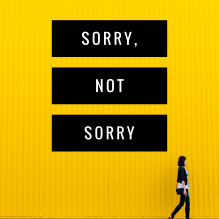Recently, I was at the Korean market with my mom. As we were walking, I could see this Korean grandma rushing up from behind us with her full cart. Even with people in front of her, she didn’t slow down, which caused her to run her cart into my mom. What happened next confused and frustrated me. My mom turned around and said, “Oh I’m so sorry.” The lady had hit my mother with her cart and my mother was the one who apologized? The grandma grunted and just kept pushing her cart along. As she rushed past us, I asked my mom in Korean, “Why are YOU apologizing when she’s the one who ran into you??” My mom pinched my arm and whispered, “Stop she can hear you.”
This culture of women constantly apologizing (for no good reason) is maddening to me. I know many a women have written about this, but it’s so damn true. Not too long ago, a friend stopped me in the middle of my sentence to tell me, “Hey, you’ve said ‘sorry’ about 5 times in our conversation. STOP it.” It’s so deep ingrained that we don’t even notice when we’re doing it: “Sorry, but can I please have a napkin?” “So sorry, but can I pass through?” “Sorry I can’t make it tonight.” “Sorry my child is crying.” Sorry this, and sorry that.
The truth is, if you didn’t actually do something wrong, there is no reason to apologize. When we do this, we subconsciously think that we are always in the wrong or that we just made a huge mistake when neither of these are true. We are constantly in a state of low level stress. Without realizing, we anticipate that we’re about to do something bad, so we start our thought off with an immediate apology. FACT: we don’t need to feel bad about “bothering” someone with a question or even our presence. We are allowed to ask questions. We are allowed to be who we are where we are…unless we’re actually not supposed to be there.
So the next time you find yourself about to apologize, see if you can substitute, “I’m sorry” for “thank you” or “excuse me” instead. I’ve found that these work in putting myself in a place of empowerment rather than a place of approval. And you know what they say about approval: you don’t need anyone’s but your own.


